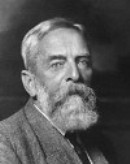Friedrich Freiherr von Wieser (German: [ˈviːzɐ]; July 10, 1851 – July 22, 1926) was an early (so-called "first generation") economist of the Austrian School of economics. Born in Vienna, the son of Privy Councillor Leopold von Wieser, a high official in the war ministry, he first trained in sociology and law. In 1872, the year he took his degree, he encountered Austrian-school founder Carl Menger's Grundsätze and switched his interest to economic theory. Wieser held posts at the universities of Vienna and Prague until succeeding Menger in Vienna in 1903, where, with brother-in-law Eugen von Böhm-Bawerk, he shaped the next generation of Austrian economists including Ludwig von Mises, Friedrich Hayek and Joseph Schumpeter in the late 1890s and early 20th century. He became Austrian finance minister in 1917.Wieser is renowned for two main works, Natural Value, which carefully details the alternative-cost doctrine and the theory of imputation, and his Social Economics (1914), an ambitious attempt to apply it to the real world. His explanation of marginal utility theory was decisive, at least terminologically: It was his term Grenznutzen (building on von Thünen's Grenzkosten) that developed into the standard term, "marginal utility," not William Stanley Jevons's "final degree of utility" or Menger's "value." His use of the modifier "natural" indicates that he regarded value as a "natural category" that would pertain to any society, no matter what institutions of property had been established.The economic calculation debate started with his notion of the paramount importance of accurate calculation to economic efficiency. Prices to him represented, above all, information about market conditions, and are thus necessary for any sort of economic activity. A socialist economy, therefore, would require a price system in order to operate.He also stressed the importance of the entrepreneur to economic change, which he saw as being brought about by “the heroic intervention of individual men who appear as leaders toward new economic shores.” This idea of leadership was later taken up by Joseph Schumpeter in his treatment of economic innovation.Unlike most other Austrian School economists, he rejected classical liberalism, writing that “freedom has to be superseded by a system of order.” This vision—and his general solution to the role of the individual in history—is best expressed in his final book, The Law of Power, published in his last year of life, a sociological examination of political order.

Birth date
1851-07-10
Birth year
1851
Death date
1926-07-22
Death year
1926



Comment
0